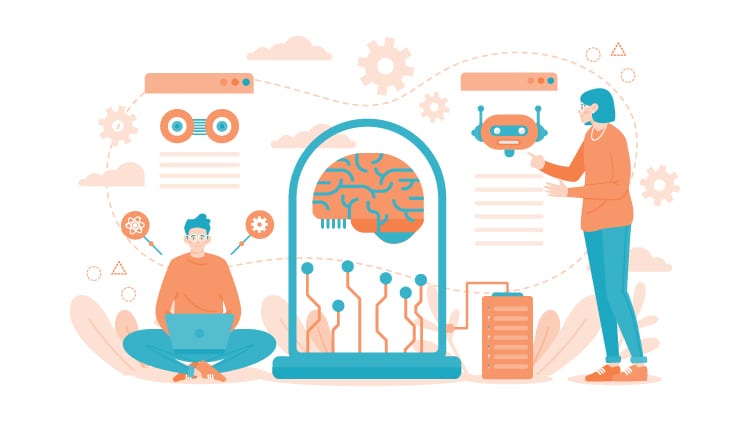Markedly, you can leverage AI tools or Artificial Intelligence capabilities to improve data capture, organization, and usage. Needless to say, the deployment of this digital technology helps thriving businesses manage key operations more accurately and efficiently than ever. Most importantly, you can make the best of AI tools to improve data asset utilization and accessibility, without a hitch.
Analyze Trends and Multiply Business Efficiency with Robust Data Management using AI
Here, the Primary Advantages of AI Data Management cover
- Smooth Execution of Hitherto Mission-Critical Issues
- Reduced Workload for Existing Workforce
- Multi-Tasking with Utmost Ease
- Less Time to Perform a Task
- No Significant Cost Outlays

Key AI Data Management Applications:
Data Integration
Notably, AI, which is an inventive cognitive technology, facilitates automation for data integration from different sources, formats, and structures. Needless to say, AIML models or AI tools map and transform data, which makes it more consistent and analyzable. For the most part, artificial intelligence is especially helpful with a variety of data sources.
Data Cleaning
Chiefly, AI-powered algorithms can fix data flaws, remove inconsistencies and duplication, and refine data. In addition, Data cleaning automation saves time and dilutes the risk of bad data-driven decisions.
Classification and Tagging
Undeniably, AI Tools can categorize and tag data by content, making it simpler to find and retrieve. Explicitly, this helps with content and document management.


Data Security
Markedly, AI empowers cybersecurity and keeps data integrity. Undeniably, Machine learning models along with artificial intelligence keep observing the network traffic and user activity to find abnormalities that could point to a security breach.
Data Storage Optimization
Among all other emerging technologies, AI can move less accessible data to cheaper storage tiers without a hitch. For the most part, it helps in Storage cost optimization and improves accessibility.
Data Search and Retrieval
Chiefly, NLP and AI-powered search engines can enhance data retrieval using query context. Most importantly, both content management systems and document archives can benefit from this.
Backup and Recovery
In general, Artificial Intelligence automates data backups to ensure frequent and safe backups. Particularly, AI can help in retrieving lost data faster and more accurately.
Data Governance and Compliance
AI, an innovative digital technology, can detect and manage sensitive data to comply with GDPR and HIPAA. Needless to say, Data retention policies and audit trails can benefit.
Data Analytics
Undeniably, scalable AI-driven analytical tools can uncover insights and trends in datasets.
Data Lifecycle Management
For the most part, AI tools can automate data production, storage, archiving, and destruction. In particular, Data is processed efficiently and by predefined policies.
Data Privacy and Consent Management
Given these points, AI can handle consent forms, track data consumption, and give consumers more control over their data.


Data Transformation & NLP
Above all, AI can convert data formats to work with certain analytic tools and models. For the most part, this involves data structuring for machine learning algorithms and statistical analytics AI Can work on sentiment analysis, summarization, and translation, it can recognize, interpret, and synthesize human language using NLP.
Data Analysis
Notably, AI can recognize the pattern, group the requirements, and helps organizations make data-driven decisions. Also, AI works on time series data to predict future patterns and generates assumptions based on past data
- Speech Recognition : AI helps in the development of voice-controlled gadgets that understand and translate speech for virtual assistants.
- Time-Series Analysis : AI can process time-series data, allowing organizations to predict future patterns and make assumptions based on past data. Time-series analysis is essential in finance, weather, and demand prediction.
- Data Visualization : Needless to say, Artificial Intelligence works on visualization of data using graphs, Charts, and dashboards. It simplifies complicated information for data-driven decision-making.
Thriving businesses can make the best of AI Data Management to lead the competitive edge by connecting to our subject-matter experts. For the most part, our team of certified and trained consultants would help you comprehend these emerging technologies in the best interest of your business and help you save substantial hours and costs under the aegis of standardized and leading practices.
For more details, write to us at info@inoday.com Or Schedule A Demo

